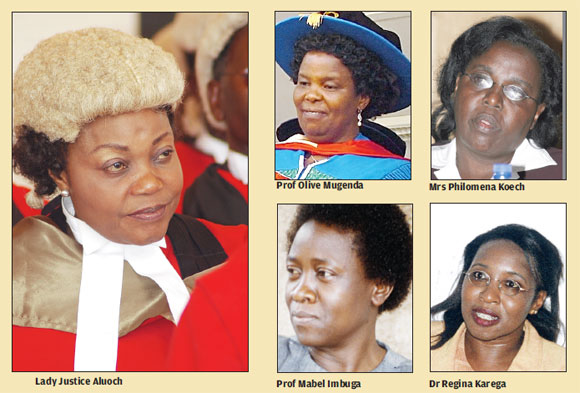By Kipchumba Some
The long-drawn and sometimes controversial campaign to boost women representation and participation in public service is finally bearing fruits, according to the Public Service Commission.
The commission’s chairman, Mr Titus Gateere, said President Kibaki’s decree two years ago that 30 per cent of all public appointments be reserved for women has boosted their numbers in civil service.
Gateere said out of the 2,174 new entrants and graduate appointments the commission made in 2007, 849 or 39 per cent of them, were women. In the same year, out of the 1,907 officers who were promoted, 425 were women, representing 22 per cent. Figures for 2008 are still being compiled, he said.
He terms the numbers ‘good progress’.
"In a few years we hope to have brought parity in terms of gender representation in public service," he said.
The other side of the coin
However, the math does not seem to add up in some quarters.
The President has been put on the spot by lobbyists for failing to observe his own decree when making appointments for top Government jobs. "He raised the hopes of women to a whole new level," says Dr Regina Karega, the chairman of National Commission on Gender and Development within the ministry of Gender and Children.
She adds: "It is unfortunate that we have not seen the President’s directive been implemented in his executive appointments to the public service in recent times."
The department she heads was created last year to drive the cause of women’s participation in public service. The recent changes in the Provincial Administration illustrate the discrepancy.
The President promoted only three women out of 26 officers to head the eight provinces and the 22 new sub-provinces.
The high-profile appointment was that of Claire Omollo as the PC of Eastern, the second woman in history to hold such a position after Philomena Koech in 1999.
Mixed fortunes
Two women were promoted among the 22 new Senior Deputy Provincial Commissioners. Long-serving administrator Ann Ngetich was put in charge of Upper Central, while Ms Lydia Muriuki now commands Eastern Nyanza.
Dr Leah Wanjama, the director of Gender and Affirmative Action Unit in the Gender ministry, says by failing to adhere to his own directive, the President was undermining the implementation of his directive by the public service. "The President has not set the trend for the PSC and the private sector to follow. As long as he makes gender-skewed appointments, there will be no imperative for public institutions to follow his directive," she says. But Gateere calls for patience, saying it would take time to realise the desired representation considering women have long been marginalised in public employment.
Kibaki’s administration has held a bag of mixed fortunes for women. In its two terms, it has taken strides to boost women representation in public service.
However, the progress can best be termed miniscule in comparison to the lofty promises. In the run-up to the 2007 General Election, the President pledged to reserve 30 per cent of all public appointments and elective positions for women, should he be re-elected.
Prime Minister Raila Odinga on the other hand promised 50 per cent if he won the presidency, the same as Vice President Kalonzo Musyoka. Nearly two years down the line, nothing tangible seems to be coming through.
Broken promises
Observers say women should have learnt politicians do not keep their promises. "We intend to hold them accountable this time round. Next year –– the deadline the government gave itself to have achieved the 30 per cent women representation –– we shall remind them of the promises," she said. It is approximated that women comprise 52 per cent of Kenya’s population. However according to the disbanded ECK 2007 database, there were about 800,000 more men voters than women.
The 2007 General Election was heralded as a significant leap for women representation in the political circles. Standing at 19, the Tenth Parliament has the highest number of women MPs ever, 13 elected and six Nominated.
The Coalition Government raised hopes even further by appointing the largest number of women to the Cabinet—seven full ministers and seven assistant ministers
Disappointingly, there was not a corresponding increased appointment of women as permanent secretaries, even after more ministries were created.
 The Standard Group Plc is a multi-media organization with investments in media
platforms spanning newspaper print operations, television, radio broadcasting,
digital and online services. The Standard Group is recognized as a leading
multi-media house in Kenya with a key influence in matters of national and
international interest.
The Standard Group Plc is a multi-media organization with investments in media
platforms spanning newspaper print operations, television, radio broadcasting,
digital and online services. The Standard Group is recognized as a leading
multi-media house in Kenya with a key influence in matters of national and
international interest.
 The Standard Group Plc is a multi-media organization with investments in media
platforms spanning newspaper print operations, television, radio broadcasting,
digital and online services. The Standard Group is recognized as a leading
multi-media house in Kenya with a key influence in matters of national and
international interest.
The Standard Group Plc is a multi-media organization with investments in media
platforms spanning newspaper print operations, television, radio broadcasting,
digital and online services. The Standard Group is recognized as a leading
multi-media house in Kenya with a key influence in matters of national and
international interest.










